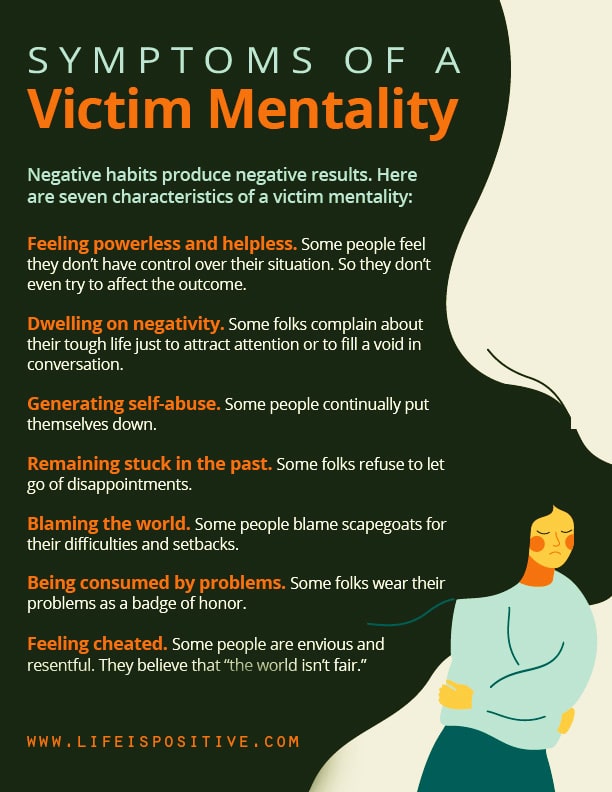|
Getting your Trinity Audio player ready...
|
Dealing with someone who has a victim mentality can feel like being stuck in a never-ending drama, where every scene is filled with self-pity and endless complaints.
You know, the type—the one who always thinks the universe is plotting against them and can’t resist turning every situation into a sob story. But hold on, don’t roll your eyes just yet!
The key to handling a victim mentality is to understand where it’s coming from without letting it drag you down.
Sure, people with a victim mentality can be a real buzzkill, but with the right approach, you can handle their constant negativity without losing your cool.
Ready to learn how to keep your sanity intact? Let’s dive into some tips for dealing with these professional pessimists.
What is a Victim Mentality?
A victim mentality is when someone sees themselves as the star of a tragedy where everything goes wrong, no matter what. They’re convinced that bad things only happen to them and that they’re totally powerless to change their circumstances.
This mindset can leave them feeling stuck, frustrated, and always a little gloomy. It’s like they’re wearing glasses that make the world look like one big, unfair mess.
But people with a victim mentality don’t just feel unlucky—they actually believe the universe has it out for them. It’s not just about having a rough day; it’s about thinking every day is a disaster, and someone else is always to blame.
Understanding this mentality helps you understand why they act the way they do so you can handle your interactions with them a little more smoothly.
Read: 10 Powerful Hacks to Let Go of the Negativity
What are the Signs of a Victim Mentality?
Spotting a victim mentality isn’t always easy, but there are some clear signs to watch out for:
1. Constant Blaming: People with a victim mentality often point fingers at everyone else for their problems. If something goes wrong, it’s never their fault. They might say things like, “This always happens to me,” or “If only people understood how tough I have it.”
2. Endless Complaining: They tend to focus on the negatives in every situation. No matter how good things might seem, they’ll find something to gripe about. They’ve got a knack for seeing the dark cloud in every silver lining.
3. Refusal to Accept Responsibility: Constructive criticism? Forget about it. They see any feedback as a personal attack. They struggle to see how their actions contribute to their own problems and often react defensively.
Read: How Bullying Affects Mental Health
4. Dwelling on the Past: People with a victim mentality often replay past hurts and failures on a loop. They use these experiences as proof that life is unfair and that they’re forever stuck in a rut.
5. Feeling Helpless and Powerless: A big sign of a victim mentality is the belief that nothing they do will ever make a difference. They see themselves as powerless to change their circumstances and often feel stuck in a cycle of negativity.
If you recognize these signs in someone, it might be time to rethink how you approach your conversations with them.
Remember, spotting these signs is the first step in helping them—and yourself—deal with the situation more effectively.
How to Deal with Someone with a Victim Mentality
So, how do you handle someone with a victim mentality without losing your patience or compassion? Here are some tips:
1. Set Boundaries: It’s important to set clear boundaries with someone who has a victim mentality. While you want to be supportive, you also need to protect your own mental health. Don’t let their negativity consume your time and energy.
2. Encourage Responsibility: Gently encourage them to take responsibility for their actions. Let them know when they are wrong; blaming others is not a sign of maturity. Instead of jumping in to solve their problems, ask questions that prompt them to think about what they can do to change their situation.
3. Offer Support, Not Solutions: It’s natural to want to fix things, but sometimes, the best support you can offer is just to listen. Let them vent, but don’t get sucked into their drama. Offer empathy, but avoid feeding into their narrative of helplessness.
4. Stay Positive: Keep the conversation positive. When they start to spiral into negativity, steer the conversation toward solutions and positive outcomes. Highlight their strengths and remind them of times when they’ve successfully dealt with challenges.
Read: Toxic Situation: How to Walk Away From Them
5. Know When to Walk Away: Sometimes, no matter how hard you try, you just can’t flip someone’s mindset switch—and that’s totally fine! It’s crucial to know when to hit the brakes and put yourself first. Remember, you’re not the hero in their never-ending saga of self-pity, and it’s definitely not your job to rescue them from their own victim mentality.
6. Lead by Example: Show them how to adopt a more positive mindset by leading by example. Share your own stories of overcoming challenges and emphasize the importance of taking charge of one’s own life.
Final Thoughts: Victim Mentality
Dealing with someone who has a victim mentality can feel like trying to climb a mountain in flip-flops, but hey, it’s not impossible!
Just remember to set some boundaries, encourage them to take responsibility, and keep your own vibe positive.
Sometimes, the best you can do is just be there for them—without letting their constant rain cloud get you drenched. Change is ultimately their job, not yours.
By spotting the signs of a victim mentality and using these tips, you’ll be ready to handle these tricky situations with grace and a good dose of empathy.
So, the next time you’re up against someone deep in victim mode, take a deep breath, keep these strategies in mind, and approach it all with a bit of kindness and patience.
For more empowering content, connect with our vibrant community here ➡️ Social Media.



